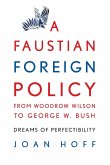To most Americans, the Gulf War symbolizes the culmination of a highly sophisticated decision-making process within the Bush administration. In this highly readable and challenging book, Hybel demonstrates the shortcomings of such a view by using cognitive models to examine how the administration defined problems, identified goals, assessed alternatives, and selected options during the seven months preceding the start of the war. This book will prove to be a critical contribution to the understanding of the Bush administration's thinking process during the Gulf crisis and of the value of cognitive models in explaining foreign policy making.







